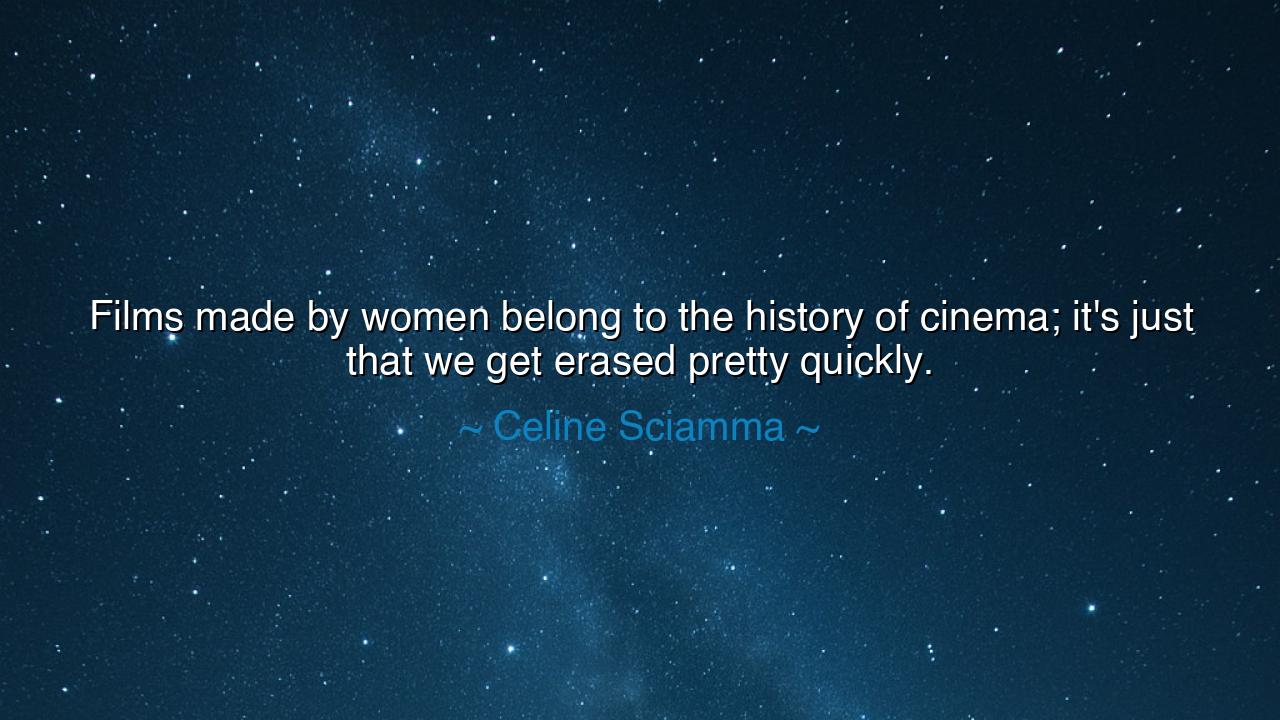
Films made by women belong to the history of cinema; it's just
Films made by women belong to the history of cinema; it's just that we get erased pretty quickly.






In the words of Céline Sciamma, the luminous storyteller of Portrait of a Lady on Fire, there burns a quiet and fierce truth: “Films made by women belong to the history of cinema; it’s just that we get erased pretty quickly.” This is not merely a lament — it is a cry carved into the stone of time, echoing through the halls of forgotten art. She speaks not of absence, but of erasure. The works of women have always been there — shimmering, brave, visionary — but the winds of history, guided by the hands of the powerful, have swept away their names. Yet the art remains, like buried embers, waiting for new generations to breathe life into their glow once more.
In ancient times, when the muses sang to the poets of Greece, their voices were always female — Calliope, Clio, Euterpe — yet the pens that wrote their stories were almost always in the hands of men. So it has been through the ages: the woman, the source of inspiration, too often denied her place as the creator. Sciamma’s words remind us that women have always made cinema, just as they have always made music, sculpture, and revolution. But their names, like whispers on the wind, were often lost — not because they were unworthy, but because history was written by those who refused to see them.
Think of Alice Guy-Blaché, the first woman to direct a film in the 1890s — a pioneer of narrative cinema itself. She created hundreds of films, taught the world how stories could move through time and emotion, and founded her own studio when few believed a woman could hold a camera. Yet for decades, her work was forgotten, her name left out of textbooks while her innovations were credited to men. It was not until scholars in the late 20th century unearthed her legacy that the truth returned to the light. Sciamma’s lament speaks for women like Alice — artists erased, but never undone.
And yet, the erasure continues in subtle forms. Women’s films are called “niche” when they speak of love, and “sentimental” when they speak of pain. Their stories are boxed as “feminine,” as though half the human soul were a footnote to the other. But cinema, in its essence, is the mirror of life, and life itself is born from both masculine and feminine spirit. To forget women’s voices in film is to blind ourselves to half of human truth. Sciamma calls us to remember, to restore the lineage that was always there — a lineage of passion, of perspective, of tenderness and defiance.
Consider the courage of Chantal Akerman, who with Jeanne Dielman dared to turn the quiet labor of a woman — cooking, cleaning, waiting — into an epic of time and endurance. When critics dismissed her, she persisted. Decades later, her film would be crowned by modern critics as the greatest of all time. So you see, though erasure is swift, remembrance is eternal. Truth always returns, even if it must climb out of silence and dust to do so.
The ancients taught that every civilization is judged by how it honors its storytellers. To erase one group of voices is to fracture the song of humanity. Thus, we must become the keepers of memory. We must name the forgotten, preserve the unseen, and listen to the silenced. For history is not a river flowing in one direction — it is a sea, and every forgotten drop changes the tide.
The lesson, then, is this: do not wait for permission to create, and do not wait for recognition to persist. If you are a maker of art, a teller of truth, or a witness of life — speak, even when no one listens, for the echo will find its way to the future. And if you are the listener, the reader, the viewer — remember your power to amplify what others would erase. Share their names, honor their work, let your memory become resistance.
So let us write anew the history of cinema — not as a narrow path walked by the few, but as a wide, radiant road shaped by all. The stories of women do not belong to the margins; they are the heartbeat of the whole. And when we remember them — when we refuse to let them be erased again — we do not merely honor the past. We awaken the future.






AAdministratorAdministrator
Welcome, honored guests. Please leave a comment, we will respond soon